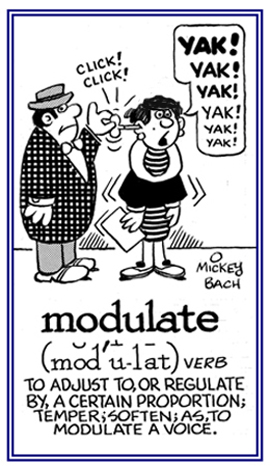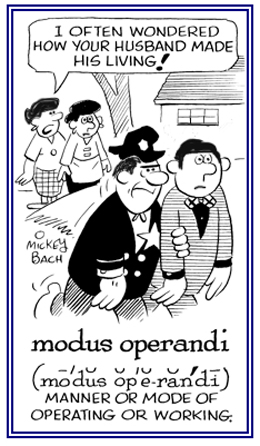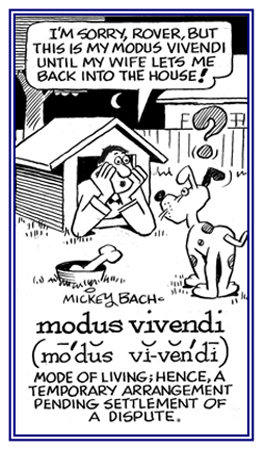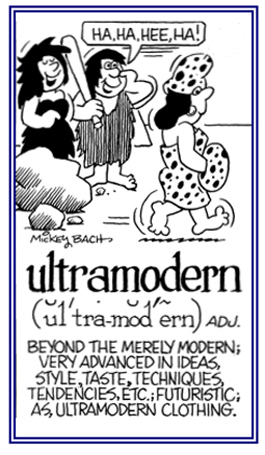mod-
(Latin: measure; suitable; size, limit, way, method; rhythm, harmony)
2. To change or to vary the pitch, intensity, or tone; such as, a person's voice or a musical instrument: Jackie had to modulate her violin so the four strings had the correct pitches.
The TV announcer was modulating his voice in order to avoid speaking in a monotone or one unvaried pitch with little or no inflection or cadence.

Go to this Word A Day Revisited Index
so you can see more of Mickey Bach's cartoons.
2. The fact of changing in some characteristic way the amplitude, frequency, or phase of a wave, or the velocity of the electrons in an electron beam.
3. A manner of speaking in which the loudness or pitch or tone of the voice is modified.
4. The rise and fall of the voice pitch.
5. A musical passage moving from one key to another.
6. Etymology: "act of singing" or "making music", from Old French modulation, "act of making music"; from Latin modulationem, modulatio, "rhythmical measure, singing and playing, melody"; from modulatus, modulari, "to regulate, to measure off properly"; from Latin modulus, "small measure".
2. In computer science, a part of a program that carries out a specific function and which may be used alone or combined with other modules of the same program.
3. In electronics, a self-contained assembly of electronic components and circuitry, such as a stage in a computer, that is installed as a unit.
4. A standard or unit of measurement.
5. The detachable compartment of a spacecraft which performs a specific task or class of tasks in support of the major function of the craft.
6. One of the inherent cognitive or perceptual powers of the mind.
7. Etymology: "an allotted measure" from Middle French module; from Latin modulus, "small measure", from modus, "measure, manner".
The meaning of an "interchangeable part" was first recorded in 1955; and the reference to the "separate section of a spacecraft" is from 1961.
A modus operandi is not restricted just to police or criminal use because it also refers to any plan, technique, or system for achieving an objective or purpose.

Go to this Word A Day Revisited Index
so you can see more of Mickey Bach's cartoons.
2. The temporary arrangement between two or more parties, or countries, to enable them to get along together, pending a full settlement of a dispute: The nations worked out a modus vivendi in order to avoid war.
There are some authorities who maintain that modus vivendi should describe only a truce between disputing parties until there is a settlement of their disagreements.
3. Etymology: a Latin phrase which means "manner of living" in English.
Go to this Word A Day Revisited Index
so you can see more of Mickey Bach's cartoons.
2. A frame or model around or on which something is formed or shaped.
3. A fixed or restrictive pattern or form.
4. Etymology: "a hollow shape" from the 12th century, from Old French modle; then from French moule; from Latin modulum, modulus, "measure, model" and ,I>modus, "manner".
2. A shaped cavity used to give a definite form to fluid or plastic material.
3. A tool for making molds.
2. A preliminary sculpture in wax or clay from which a finished work can be copied.
3. A sculpture produced by molding.
2. A set of verb forms or inflections used to indicate the speaker's attitude toward the factuality or likelihood of the action or condition expressed.
In English, the indicative mood is used to make factual statements, the subjunctive mood to indicate doubt or unlikelihood, and the imperative mood to express a command.
3. Etymology: "a grammatical form indicating the function of a verb" from 1569, and an alteration of mode, but the grammatical and musical (1597) usages of it influenced the meaning of mood in phrases such as "light-hearted mood".2. A sculpture produced by molding.
3. Etymology: "a hollow shape" from the 12th century; from Old French modle from French moule; from Latin modulum, modulus, "measure, model" a form of modus, "manner".
2. Varying the angle of a wave in a carrier in order to transmit analog or digital data.
For digital signals, phase modulation (PM) is widely used in conjunction with amplitude modulation (AM); for example, quadrature amplitude modulation (QAM) uses both phase and amplitude modulation to create different binary states for transmission.
2. A disruptive event that causes wild and uncontrollable disturbances: The extreme commotion, created by the sudden cloudburst in front of the opera building after the performance, resulted in a big turmoil because so many people wanted to go home by taxi at the same time!
3. Etymology: perhaps an alteration of Middle French tremouille, "mill hopper", a reference to the hopper's constant motion of going back and forth, from Latin trimodia, "vessel containing three modii", from modius, "a Roman dry measure", related to modus, "measure".

Go to this Word A Day Revisited Index
so you can see more of Mickey Bach's cartoons.


